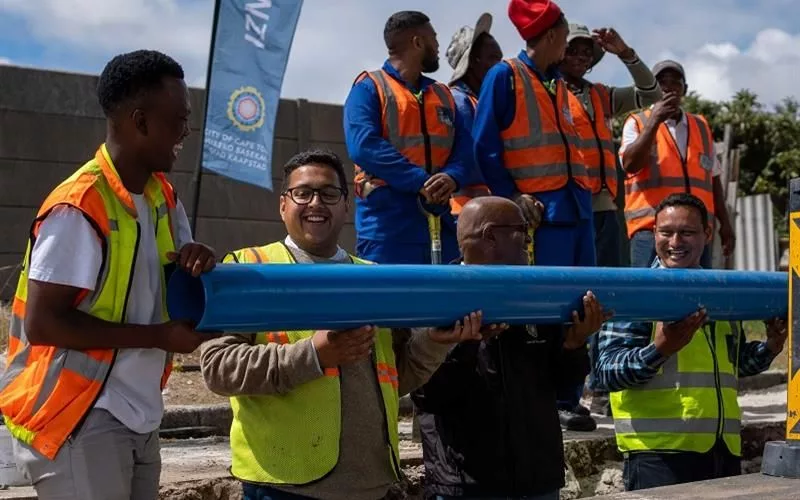Cape Town’s Water and Sanitation Vision aims to provide dignified water and sanitation services to all residents, with a proposed budget of R5,317bn dedicated to water and sanitation in the financial year of 2024/2025. The plan includes installing new taps and toilets in informal settlements, diversifying water sources, and improving infrastructure and treatment facilities. The city is also committed to building resilience during instances of load-shedding, preserving the environment, and reducing the risk of pollution. This investment signifies a brighter, sustainable future for the city and its inhabitants.
What is Cape Town’s Water and Sanitation Vision?
Cape Town’s Water and Sanitation Vision aims to provide dignified water and sanitation services to all its residents. The proposed budget of R5,317bn specifically for water and sanitation in the financial year of 2024/2025 includes installing new taps and toilets in informal settlements, diversifying water sources, and improving infrastructure and treatment facilities. The city is also committed to building resilience during instances of load-shedding, preserving the environment, and reducing the risk of pollution.
As dawn breaks over Cape Town and the city’s legendary Table Mountain is bathed in sunlight, it uncovers an image of a greener, sustainable tomorrow. This future is sculpted by a remarkable proposed capital budget of R5,317bn specifically for water and sanitation in the financial year of 2024/2025. This initiative is set to revolutionize the lives of its inhabitants and strengthen the city’s resilience against water scarcity.
Known for its lively culture and stunning landscapes, Cape Town has also had to grapple with the serious issue of water shortage over time. When Councillor Zahid Badroodien, the Mayoral Committee Member for Water and Sanitation, pledges a significant investment in water and sanitation services, it shines a light of hope onto the citizens. A hope that represents a future with guaranteed access to potable water, enhanced sanitation facilities, and a fortified environment.
Prioritizing Residents and Diversifying Water Sources
The audacious plan is not just a symbol of the city’s resilience but also exhibits a commitment to providing dignified water and sanitation services to all residents of Cape Town. It’s a testament to an investment that especially targets the city’s vulnerable informal settlements. A hefty sum of R38.25 million is pledged to install new taps and toilets, over and above the existing services. This initiative strives to ameliorate the daily lives of the settlement dwellers, ensuring they have access to crucial resources.
Another aspect of the proposed budget reveals the city’s goal to broaden its water sources. Currently, the city depends on surface water for 98% of its potable water. However, the city plans to lessen this reliance. By 2040, alternative water sources like groundwater, desalination, and water reuse will comprise 25% of the city’s water supply. This significant shift in strategy will contribute to establishing a resilient water future for the city. In conjunction with this, efforts will be redoubled to eradicate alien invasive plant species from catchment areas, thereby enhancing the health and productivity of these critical water sources.
Infrastructure and Treatment Focus
A significant segment of the budget, amounting to R460.16 million, will be directed towards infrastructure projects, with a particular emphasis on aquifer projects. This encompasses the Cape Flats Aquifer Recharge, Atlantis Aquifer, and the Table Mountain Group Aquifer. These initiatives form part of the wider New Water Programme, which aims to increase the city’s water supply by an additional 300 million litres every day by 2030.
Cape Town is also concentrating on the treatment of its water supply. An approximate amount of R2.58 billion has been set aside for extensions and upgrades at Wastewater Treatment Works (WWTWs) in the upcoming financial year. These enhancements aim to increase the capacity of key facilities like Potsdam, Athlone, Bellville, and Macassar. The overall plan includes a proactive strategy to prevent sewer overflows, with a proposed budget of R1.07 billion for related projects. These projects comprise the upgrading and refurbishing of sewer pump stations and the replacement of old sewer pipes.
Securing Reliable Water Supply and Bolstering City’s Resilience
The city’s vision also encompasses ensuring a reliable water supply to properties. A proposed investment of R83.36 million is set for the replacement of 50km of water pipes. Communities stretching from Hout Bay to Fairfield Estate are expected to benefit from this initiative, ensuring a secure and enhanced water supply.
In line with efforts to strengthen its water and sanitation services, the city is also working towards building resilience during instances of load-shedding. An allocation of R127.7 million is set for generators and UPS installations for sewer and water pump stations and wastewater treatment plants. This ensures continuous services during power outages, further strengthening the city’s resilience.
Preserving the Environment and Reducing Risk of Pollution
Cape Town, a city that treasures its natural beauty, is equally committed to preserving its waterways and mitigating the risk of pollution. An investment of R137.86 million is set to be channeled towards projects aimed at reducing the risk of flooding and improving waterways, thereby safeguarding the city’s environment.
Cape Town’s trailblazing plan underpins the city’s dedication to building a resilient water future. Serving as a model that can be mirrored, it acts as a reminder of the power of strategic investment in water and sanitation services. Through this commitment, Cape Town is not just securing its survival, but also setting the benchmark for cities worldwide. It’s a tale of resilience and hope, a pledge to its citizens, and a commitment to a sustainable future.
1. What is Cape Town’s Water and Sanitation Vision?
Cape Town’s Water and Sanitation Vision aims to provide dignified water and sanitation services to all its residents. The proposed budget of R5,317bn specifically for water and sanitation in the financial year of 2024/2025 includes installing new taps and toilets in informal settlements, diversifying water sources, and improving infrastructure and treatment facilities.
2. What is the proposed budget for Cape Town’s Water and Sanitation Vision?
The proposed budget for Cape Town’s Water and Sanitation Vision is R5,317bn for the financial year of 2024/2025.
3. What is the city’s goal for broadening its water sources?
The city plans to lessen its reliance on surface water, which currently provides 98% of its potable water. By 2040, alternative water sources like groundwater, desalination, and water reuse will comprise 25% of the city’s water supply.
4. What is the focus of the infrastructure projects in Cape Town’s Water and Sanitation Vision?
A significant segment of the budget, amounting to R460.16 million, will be directed towards infrastructure projects, with a particular emphasis on aquifer projects. This encompasses the Cape Flats Aquifer Recharge, Atlantis Aquifer, and the Table Mountain Group Aquifer.
5. What is the city doing to ensure reliable water supply and bolster its resilience?
The city is investing in the replacement of 50km of water pipes, allocating R83.36 million to ensure a secure and enhanced water supply. Additionally, R127.7 million is set for generators and UPS installations for sewer and water pump stations and wastewater treatment plants, ensuring continuous services during power outages.
6. Is Cape Town’s Water and Sanitation Vision committed to preserving the environment and reducing the risk of pollution?
Yes, Cape Town is committed to preserving its natural beauty and mitigating the risk of pollution. An investment of R137.86 million is set to be channeled towards projects aimed at reducing the risk of flooding and improving waterways, thereby safeguarding the city’s environment.












